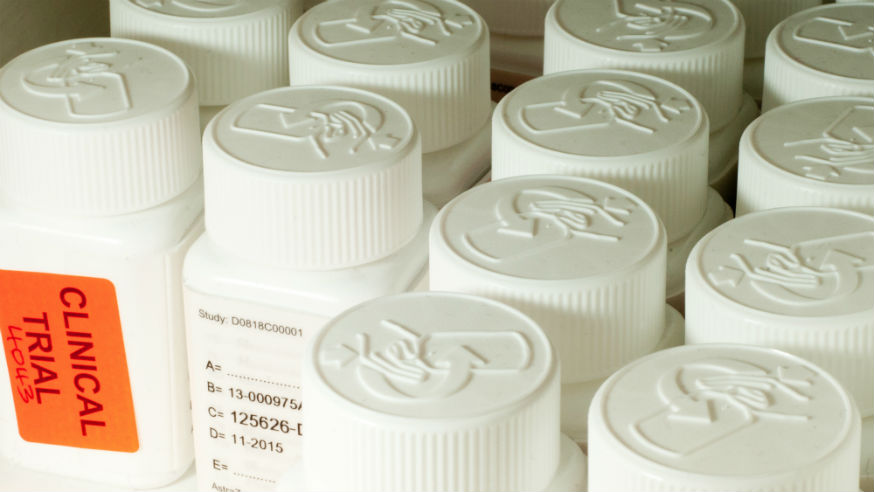
ProNAi Therapeutics, Inc. (NASDAQ: DNAI), a clinical-stage drug development company advancing targeted therapeutics for the treatment of patients with cancer, today announced that it has obtained an exclusive license from the CRT Pioneer Fund LP for worldwide rights to develop and commercialize PNT737 (formerly CCT245737), a highly selective, orally available, small molecule inhibitor of Checkpoint kinase 1 (Chk1).
PNT737 is being investigated in two recently initiated Phase 1 clinical trials, currently sponsored and managed by the Cancer Research UK Centre for Drug Development, led by The Institute of Cancer Research, London, and The Royal Marsden NHS Foundation Trust. (ClinicalTrials.gov identifiers: NCT02797977 and NCT02797964).
Under the terms of the agreement, ProNAi will pay the CRT Pioneer Fund an upfront payment of US$7.0 million. ProNAi will take on sponsorship and management of the clinical development of the agent from Cancer Research UK’s Centre for Drug Development and pay a fee of up to $2.0 million upon the successful transfer of the two ongoing Phase 1 clinical trials to the Company. Additional payments in the aggregate amount of up to US$319.5 million may become payable upon achievement of certain development, regulatory and commercial milestones. ProNAi will also owe CRT Pioneer Fund high single to low double digit royalties on net sales.
“This transaction adds another high-quality asset to our pipeline. PNT737 targets the DNA Damage Response (DDR) network, a promising approach to treating cancer based on recent leading-edge discoveries in cancer biology,” said Dr. Nick Glover, President and CEO of ProNAi. “Cancer cells often depend on activated Chk1, a central cell cycle checkpoint regulator in the DDR network, as a strategy to survive and replicate despite accumulating extensive DNA damage due to replicative stress or in response to chemotherapeutic intervention. PNT737 is a potent and selective inhibitor of Chk1 that targets a potential Achilles’ heel of cancer cell proliferation and survival.”
PNT737 was discovered and initially developed by scientists in the Cancer Research UK Cancer Therapeutics Unit at the ICR in collaboration with Sareum Holdings plc (LSE AIM: SAR), with funding provided by Cancer Research UK, the ICR and Sareum. The program was licensed in September 2013 to the CRT Pioneer Fund, a specialist cancer investment fund established by Sixth Element Capital LLP (6EC), Cancer Research Technology (CRT) and the European Investment Fund (EIF) and managed by 6EC.
“This is another significant milestone on the development path for this promising Chk1 inhibitor. We recently initiated a Phase 1 single agent monotherapy study and a Phase 1 study of PNT737 in combination with DNA-targeting chemotherapies. ProNAi has a world-class oncology development team and is well-capitalized, and we believe these studies and the ongoing development strategy for this drug are in excellent hands,” added Robert James, Managing Partner of 6EC.
Dr Udai Banerji, Cancer Research UK Reader in Molecular Cancer Pharmacology at the ICR and Consultant at The Royal Marsden, stated: "This is an exciting opportunity to investigate a novel anticancer agent targeting the aberrant tumor DDR pathway. Two PNT737 clinical trials are now underway and, as Principal Investigator of these studies, I look forward to working closely with ProNAi to optimize the development path for this promising drug candidate.”
Professor Paul Workman, Chief Executive and President of The Institute of Cancer Research, London, said: "I’m very pleased that ProNAi has secured the licence to take forward development of PNT737. This drug – which was discovered here at the ICR – represents an exciting new approach to targeting Chk1 and one that holds significant potential for treating several tumor types. I anticipate this agreement will help accelerate development of PNT737 and lead to an expanded program of clinical trials, to maximize the chances of patient benefit as quickly as possible.”
Clinical development is currently taking place in facilities funded by Cancer Research UK, the National Institute for Health Research (NIHR) Biomedical Research Centre (BRC) at The Royal Marsden and ICR, and the Experimental Cancer Medicine Centre Network. ProNAi anticipates expanding on the current clinical program underway for PNT737, including into the United States, with the expectation of filing an Investigational New Drug application in the second half of 2017. To support broader studies, ProNAi plans to conduct research designed to explore markers of sensitivity to PNT737 that may facilitate patient selection and to identify additional therapeutic combination strategies.
“The ICR and The Royal Marsden are world renowned for their work together in cancer research and this is a great opportunity for our team to collaborate on the early clinical development of a promising anti-cancer agent, where we can potentially employ innovative development strategies and leverage emerging science,” said Dr Barbara Klencke, Chief Development Officer of ProNAi. “A possible development path for PNT737 is the treatment of tumors carrying mutations in genes known to contribute to DNA damage and genomic instability – a key hallmark of cancer. The significant and persistent DNA damage caused by these mutations, coupled with Chk1 inhibition, may result in death of the cancer cells, a synergistic effect referred to as ‘synthetic lethality’. Similarly, excessive DNA damage can be induced with certain chemotherapies or radiation, highlighting the potential for synergies between these modalities and Chk1 inhibition.”
“ProNAi is also advancing PNT141, a Cdc7 inhibitor that regulates DNA replication and the DDR network in a different, potentially complementary way to PNT737. Inhibiting both Chk1 and Cdc7 simultaneously may be advantageous and presents the potential for novel combination strategies for PNT737 and PNT141,” added Dr Christian Hassig, Senior Vice President, Research at ProNAi.